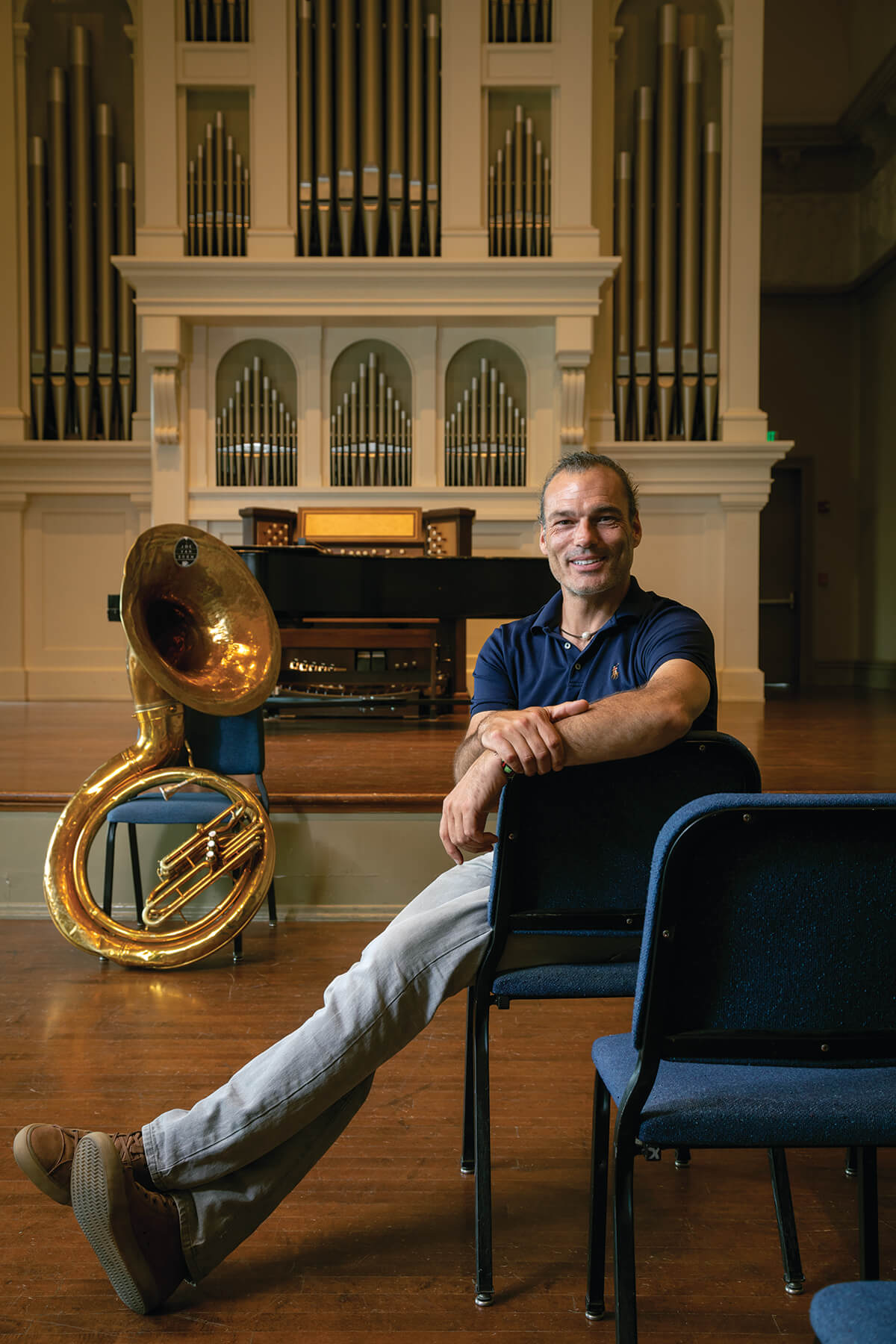GameChangers
Through Peabody’s Tuned-In Program, Daniel Trahey Empowers Students to Stick with Music
The year-round program creates a free, formalized framework for musically inclined city school students, pre-K through grade 12.

When Daniel Trahey first arrived in Baltimore from rural Michigan in the late 1990s, the Detroit-native and Peabody Conservatory freshman was shocked to discover that none of his classmates were from the city.
“Like nobody,” says the 45-year-old tuba player. “I was just a naïve kid, wanting to get more acquainted here, to find more gigs, to know what churches to call.”
Slowly, Trahey started to connect the dots. During undergrad, he landed a job at the Baltimore School for the Arts’ TWIGS after-school program, and there, he learned that while superb music programs did exist sporadically all through the city’s public school system, there was no formal framework to shepherd these budding musicians throughout their education, leading students to give up their instruments, find them late, or never come to them in the first place.
“The problem is there’s not a lot of throughlines for our kids, so if someone starts violin in kindergarten, it’s really hard for the city to take them up through 12th grade,” says Trahey. “We wanted to create that.”
In 2007, he and fellow Peabody professor Elijah Wirth co-founded Tuned-In at the Peabody Preparatory. Inspired by Venezuela’s El Sistema music education program, the year-round program creates an integrated and intensive track for musically inclined city school students, pre-K through grade 12. It provides everything from private lessons, ensemble practices, and classes like composition and digital audio to tutoring, academic counseling, and financial coverage for instruments, auditions, and college visits—all for free, from enrollment through graduation.
“This is methodical, and it’s small, so there’s the time, energy, and money being spent to really make a difference,” says Trahey, who credits close collaboration with local schoolteachers to help make their programming possible, as well as the generosity of both Peabody’s parent university, Johns Hopkins, and local and national donors. “The resources were there—we just needed to pull them together.”
Several students also participate in the Baltimore Symphony Orchestra’s OrchKids, which Trahey co-founded with Marin Alsop in 2008, but Tuned-In is not a track program toward becoming the next Yo-Yo Ma. The students focus not just on orchestra but on jazz band and improvisational music. Even then, the staff encourages their other extracurricular activities, like dance or sports teams. At the end of the day, the goal is to get every one of them a full scholarship to at least two schools of their choice, whether they plan to major in music, medicine, or political science.
“So they can say, hey, I got into [a historically Black college], and I also got into Juilliard,” says Trahey. “We’re not looking to produce classical musicians, or blues musicians, or whatever it may be—we want to help students find their voice.”
Trahey knows first hand what music can provide a young person. A big part of his job is not just teaching but listening to his students. Amidst the murder of Freddie Gray, for example, they opted to remove “Ode to Joy” from their repertoire and focused on writing their own music.
Those moments have stuck with him over the last 15 years, a reminder to not “get bigger and better, but deeper,” as he puts it, with the ripple effects of Tuned-In being felt in the upper echelons of the music world. More and more Peabody, Oberlin, and Yale students now hail from Baltimore. As do performers from the National Symphony to Broadway. Several of the program’s 150 alumni have returned to join the staff at Tuned-In, too.
“My students, and their families, have taught me how to live a better life,” says Trahey. “They have taught me what community means. And they’ve even helped me become a little bit wiser.”